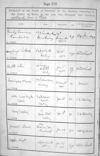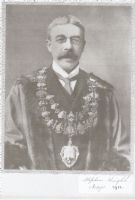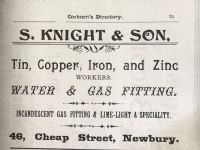STEPHEN KNIGHT
By the death of Captain Stephen Knight, of Holland House, Stroud Green, the town had lost an outstanding personality. Capt. Knight was Mayor of the Borough 34 years ago, both his father and uncle having preceded him in the mayoral office, to which he was further linked by an ancestor on his mother's side, Thomas Paradise, who was Mayor as far back as 1678. Capt. Knight lived a full life up to the end. He was present at a Masonic gathering on Thursday evening and was found dead soon after getting up the next morning. Although he was in his 80th year, he had by no means reached the end of his usefulness and will be much missed in the town. In this office we have lost a good a good friend and cheery visitor, who was always ready to advise and place his great knowledge of bees at the service of the public through the Newbury Weekly News.
Stephen Knight came of a family identified with the town for generations. His great grandfather was a stage coach driver between Newbury and London. His grandfather was in the employ of the Kennet and Avon Canal Co., and lived at Weighbridge House at the Wharf. Stephen was educated at Newbury Grammar School. This was before the present school buildings were erected and when it was at The Litten. Leaving school. His father brought him up in his own calling as tin-smith and copper-smith. In everything he took up he was most methodical and painstaking, and became a craftsman, able to make things with his own hands, such as is rarely met with these days. He believed in the dignity of labour and was never ashamed, when on a job to be seen walking through the streets in his working clothes, carrying his bag of tools in his hand. He was always industrious, and as a boy kept bees. This early bee-keeping laid the foundation of a hobby which lasted him right throughout his long life. He never stopped learning about bees until the end and this was how he became the chief expert in bee-keeping in the Newbury District and had even a much wider reputation.
Capt. Knight may be said to have started public life as a member of the old St Nicholas Debating Society, but his chief training in this direction was gained through the Guildhall Club, of which he was an original member. A popular education feature of those days was the lecture and many given by eminent men in the world of science and travel were illustrated by lantern views. With the late Mr E. J. Forster, Mr Knight purchased an oxyhydrogen lantern and with this they used to illustrate the lectures of many well-known men like Sir Robert Ball, Edward Whymper, Hiram Maxim, the Rev. J.M. Bacon, Arthur Dicsy and Sir Howard Vincent. The last-named was a local resident living at Donnington Halt, and his lectures were more of a political nature. Intensely patriotic Mr Knight joined the old Volunteers and was a member of the E Newbury (Company) when Capt. Somerset was in command. He continued with the regiment when it became part of the Territorial Army under Lord Haldane's scheme of Army reform, only retiring in 1911 after 21 years service, when he was elected Mayor and his time became so fully occupied with civic affairs. He rejoined in August 1914, and served during the war, retiring in 1920 with the permanent rank of Captain.
Captain Knight was elected on the Newbury Town Council in 1905, becoming Mayor in 1911. He proved a most efficient and business like Mayor and when he took office he announced that every morning from nine o'clock to ten he would be available at his place of business in Cheap Street if anyone wished to consult him upon town affairs. Capt. Knight did not leave the Council until 1921. Up to the time of the war he was the most regular of all members and always held the best average for attendance at Council meetings and committees. During the war he was away on service and naturally could not keep up this average.
Capt. Knight was the doyen of Freemasons in this locality if not in the Province. He was held in very high honour by his brother masons, who regarded him as an authority on the constitution of masonry and in fact everything connected with the craft. He had a marvellous knowledge of masonic ritual and precedence.
Appended is his masonic record;
Initiated in the Loyal Berkshire Lodge of Hope, No. 574, Newbury, in 1890; Master in 1898; acting Master 1900; subscribing member for 55 years & a Founder of the Hungerford Lodge, No. 4748, Hungerford, in 1925; Master 1926. Honorary Member of the Victory Lodge, No. 3954, Newbury, and of the Aldermaston Lodge No. 2760, Aldermaston. Preceptor of the Hope Lodge of Instruction for 50 years, Hungerford Lodge of Instruction for 19 years, and the Victory Lodge of Instruction for 15 years. Past Provincial Grand Treasurer Berkshire. Appointed Assistant Grand Sword Bearer of England in 1934.
Mark- Advanced in the Porchester Lodge, No 27, Newbury.
Life Governor of the three Royal Masonic Institutions to charity- jewel with bar.
Captain Knight lived a full life, what with his public works, his masonic interests, his bee-keeping and his gardening, and if he could help in any way he has never been known to refuse. During the war he has been an A.R.P. Warden at Post 4 (Greenham House) right from the start, and has always turned out for alarms at night. He was a very happy man as he has always had his time fully occupied doing work for others.
THE FUNERAL
There was a large attendance, with Free Masons in the majority, at the funeral service, which took place at Newbury Parish Church on Tuesday afternoon. This was conducted by the Rector (Rev. Bertram Russell) assisted by the Rev. C.E. Hardy, who is chaplain of the Hope Lodge of Freemasons. The hymns were “Ten thousand times ten thousand”, “All things bright and beautiful” and “Lead kindly light”. The organist Mr G. A. Sellick, played Requiem Aeternam (Basil Harwood) and Chorale in E (Cesar Franck) as the congregation assembled, and Solemn Melody (Walford Davies) at the end of the service. The Rector paid tribute to the life and character of Capt.Stephen Knight, whom, he said, laboured unceasingly for the welfare of his fellow men.
The family mourners were Mrs Robinson (daughter), Major C.S.Chiesman (son-in-law) and Mr George Hall (cousin), on behalf of his mother Mrs Hall. |




.jpeg.jpg)

